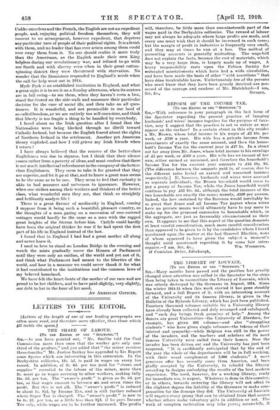REFORM OF THE INCOME TAX.
[To Tat EDITOR OF VIE EPECTATOR."3 SIR,—With reference to your paragraph in the last issue of the Spectator regarding the present practice of lumping husbands and wives' incomes together for tho purpose of taxa- tion, may I suggest that the practice is not so unfair as may appear on the surface? In a certain street in this city resides a Mr, Brown, whose total income is his wages of £2 10a. per week, or £130 a year. His wife has a private income from investments of exactly the same amount, and thus the house- hold's Income Tax for the current year is £17 5s. In a street not far away lives Mr. Jones, whose total income is his earnings of £5 per week, or .2260 a year. His wife has no income of her own, either earned or unearned, and therefore the household's Income Tax for the current year amounts to £12 18s. 9d. . [The difference between the amennts paid is, of course, duo to the different rates levied on earned and unearned incomes respectively.] If, however, husbands and wives were assessed as separate individuals, the Brown household would cease to pay a penny of Income Tax, while the Jones household would continue to pay £12 18s. 9d., although the total incomes of the two households are exactly the same; namely, £260 per annum. Indeed, the loss snsteined by the Revenue would inevitably be so great that Jones and all Income Tax payers whose wives have no private means would ultimately have to pay more to make up for the proposed concession to households which, in the aggregate, are just as favourably circumstanced as their own. It appears to me that this aspect of the question demands at least careful consideration, much more careful consideration than appeared to begiven to it by the candidates whom I beard questioned upon the matter at the last General Election, none of whom appeared to have given the subject a moment's thought until questioned regarding it by some fair inter- rogator.—I am, Sir, &r., We. WOODBURN. 51 Comiston Drive, Edinburgh,



































 Previous page
Previous page